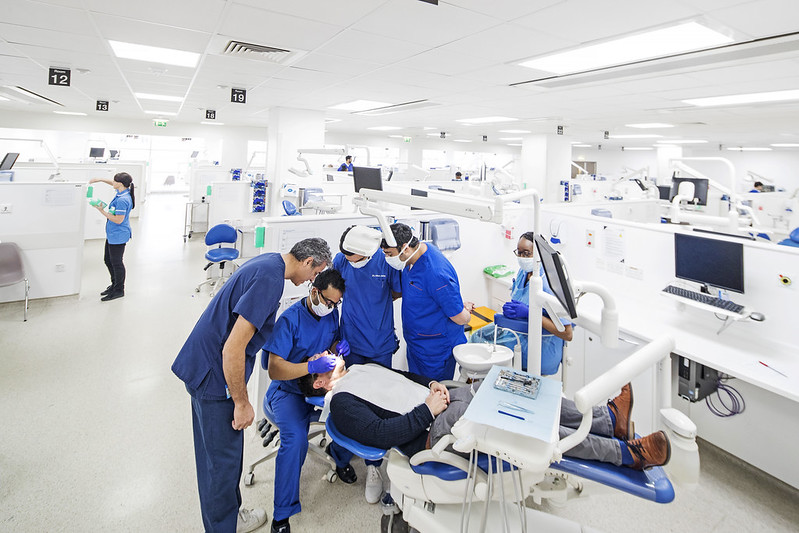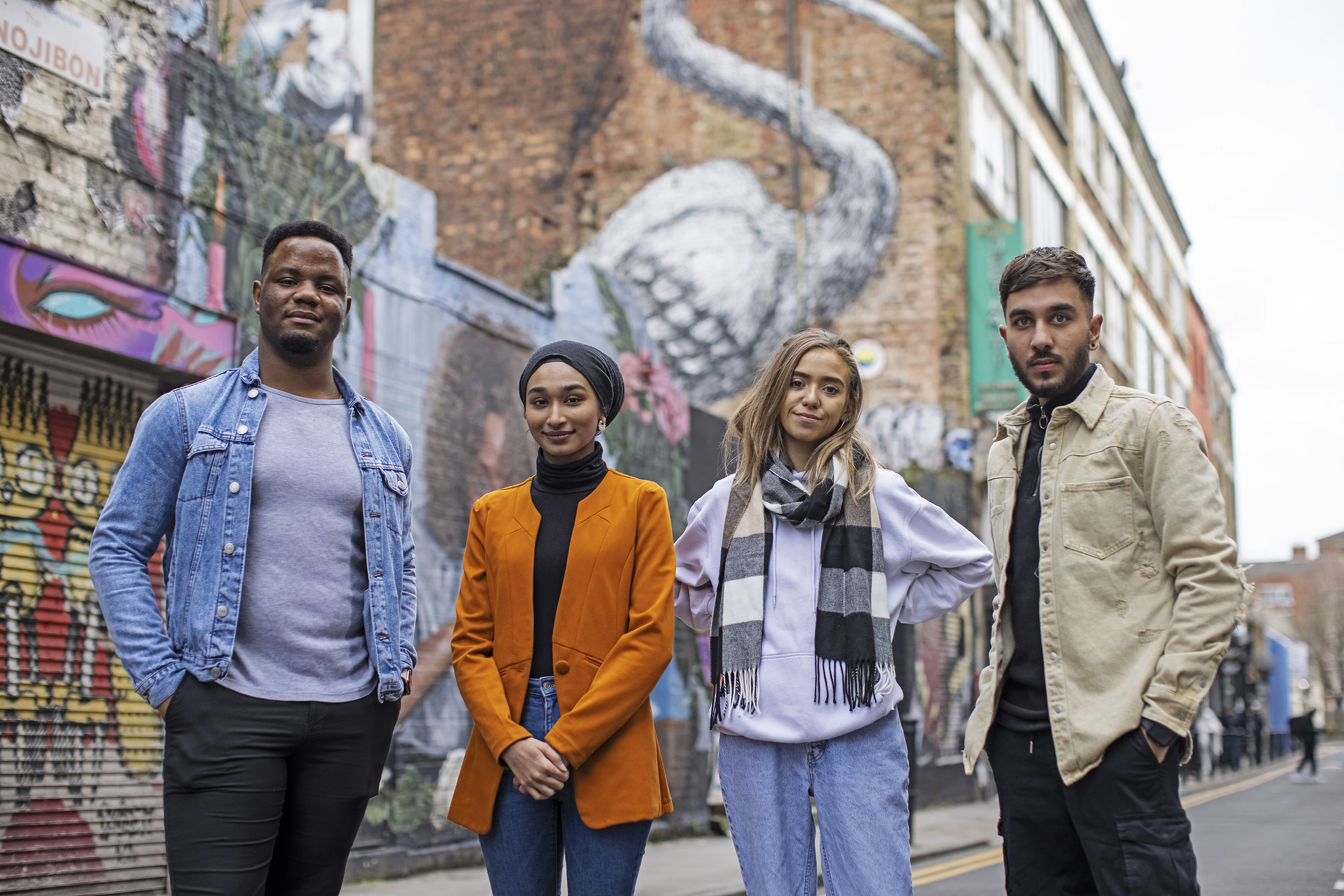Medicine and Dentistry students funding
In year 5 for first degree students on the MBBS or BDS and years 2-4 of the Graduate Entry Programme your funding will come from the NHS via NHS Student Bursaries on behalf of the Department of Health, which is explained on this webpage.
During NHS funded years, students can still apply for a reduced rate Maintenance Loan from Student Finance. On this page we also explain funding for electives, and for intercalations.
 Students studying a Medical or Dental course should first read our Government Student Finance webpage.
Students studying a Medical or Dental course should first read our Government Student Finance webpage.
We have summarised the funding arrangements for all the different programmes in the Schools of Medicine and Dentistry in the sections below.
Eligibility rules for Student Finance and NHS funding are explained on our Government Student Finance page.
To plan your funding, please also read our webpages about:
Student Finance reduced rate Maintenance Loan
During NHS funded years, students can still apply for a reduced rate Maintenance Loan from Student Finance, in addition to any NHS funding you are eligible for.
- The reduced rate of loan is non income assessed. The amounts in 2024/25 are:
Final year:
Away from home: £2,870
Parental home: £1,520
Non-final year:
Away from home: £3,749
Parental home: £2,004
- The amounts in 2025/26 are:
Final year:
Away from home: £2,959
Parental home: £1,567
Non-final year:
Away from home: £3,865
Parental home: £2,066
Read about applying for Student Finance on our Government Student Finance webpage.
What NHS funding is available?
The NHS funding consists of different elements. The amounts mentioned below are for the current 2024/25 academic year. You can also read about these in the NHS Funding for Medical and Dental students guide 2024/25
NHS Tuition Fee Grant
In your NHS funded years of study, some or all of your tuition fees will be paid for you by NHS Student Bursaries. The money will be paid directly to Queen Mary. This grant is non-income assessed. You do not have to repay this money.
NHS Bursary for living costs
In your NHS funded years of study you can apply to NHS Student Bursaries for an income assessed NHS bursary to help pay for living costs such as rent and food. You can apply for this in addition to a Student Finance Reduced Rate Maintenance Loan. The NHS Bursary is non-repayable.
The maximum NHS bursary amount for students living away from home and studying in London is £3,255. If you live at home, the maximum is £2,251.
NHS Grant for living costs
In your NHS funded years of study you can also apply for a non-income assessed grant of £1,020 to help pay your living costs. This grant is non-repayable.
Extra Weeks Allowance
You can get an extra amount of NHS Bursary for each week that your academic year is longer than the standard period of 30 weeks and 3 days (excluding university vacation periods). The Extra Weeks Allowance is income assessed and is non-repayable. The maximum amount is £110 a week if you are living away from your parental home and £57 a week if you are living in your parental home.
If an academic year of your programme lasts for 45 weeks or more, you can get Extra Weeks Allowance to cover all 52 weeks of the year i.e. 22 weeks of Extra Weeks Allowance.
NHS Student Bursaries will assess your entitlement for the Extra Weeks Allowance using the semester dates that you put on your NHS Bursary application, so it is important that these dates are correct. You can check these dates with the Student Office at Whitechapel.
The Extra Weeks’ Allowance is paid instead of the Student Finance England long courses loan in the NHS funded years of your programme.
Additional Allowances
In academic years where you are eligible for NHS funding, you will apply for Additional Allowances from the NHS instead of supplementary grants from Student Finance England. These include:
- Dependants Allowance,
- Parent Learning Allowance,
- Childcare Allowance,
- Disabled Students Allowance.
- Travel and Dual Accommodation Expenses (TDAE)
There are also arrangements for students to continue to receive NHS Bursary payments during authorised absences from study for maternity, paternity or adoption reasons. Your entitlement will depend on your personal circumstances. There is more information on the NHS Bursaries website.
Members of the regular Armed Forces
If you are studying medicine or dentistry and are a member of the regular armed forces, your eligibility for NHS funding depends on whether you are seconded or sponsored. If you are seconded by the armed forces, where the armed forces pay you a salary whilst you study, you will not be eligible for an NHS tuition fee grant, an NHS bursary for living costs or any additional allowances. If, however you are sponsored and get an armed forces scholarship, bursary or award, you would not be eligible for an NHS tuition fee grant or NHS bursary for living costs if your income after your scholarship, bursary or award in an academic year exceeds the maximum amount of NHS fee grant and NHS bursary that would have been payable had you not been getting the scholarship, bursary or award from the armed forces.
New Students
There is a step-by-step guide to Completing your NHS Bursary application.
All applications must be made within 9 months of the start of the academic year for which a claim for an NHS Bursary (including the tuition fee contribution) is being made. This includes any documentary evidence you are asked to send to us in support of your application. It's advisable to apply well before the deadline to ensure that your money is paid at the start of the academic year.
Continuing Students
If you have previously received NHS funding and are applying for a subsequent year of NHS funding, you should use your existing BOSS login details to reapply for your funding and not create a new BOSS account.
The NHS income assessment
Your ‘residual income’ is used to assess your NHS Bursary entitlement. This is the gross taxable income of your parent(s)/spouse/partner/civil partner for the previous financial year, minus certain allowable expenses. Note: Student Finance England automatically assess students as independent if they are over the age of 25 at the start of an academic year (1 September) and parents income is not required. However the NHS rules are different and regardless of age, you will still be assessed on your parent(s) income unless you meet the alternative rules (see below) to be assessed as independent.
Students with a residual income of below £26,598 are eligible to receive the maximum amount of income assessed NHS Bursary. If the residual income is above £26,598, the Bursary is reduced by £45 plus £1 for every £9.50 of household income above £26,598. Detailed information about the financial income assessment is explained in the NHS Bursary Funding booklet on the NHS Bursaries website.
Current Year Income Assessment
A Current Income Assessment form should be completed if your parent(s) or civil partner's/partner's income has dropped by 15% or more compared to the previous tax year.
The form needs to be completed by the parent(s) or civil partner/partner and most recent income evidence provided such as payslips, P45s, benefit evidence etc for consideration. The NHS BSA would usually check at the end of the year if the income had actually been what was estimated. If the income was higher. you would usually be reassessed and may have to repay some of your NHS Bursary if you were overpaid.
Independent students (care experienced or estranged)
Independent status
If you are assessed as being eligible for independent status for NHS funding, this means that you will not be required to provide parental income information for the NHS income assessment. If you meet one of the below criteria you should be treated as an independent student for NHS funding. Note that for NHS Funding you will not be assessed as independent simply on the basis that you are aged 25 or over. This is a key difference to the Student Finance rules on independent status. If you have been treated as independent for the purposes of Student Finance in the earlier years of your course due to being aged over 25, you might find that you are no longer eligible for independent status once you enter your NHS funded years if you cannot meet one of the specific NHS requirements below:
- You have the care of a dependent child or children (under 18 years of age) on the first day (1st September) of the academic year in which you are applying for a bursary; or
- You are or have been married, in a civil partnership, divorced or widowed before the start of the academic year for which you are applying for a bursary; or
- You have no living parents; or
- Your parents cannot be traced or it is not practical or possible to contact them or;
- Your parents live abroad and the assessment of a parental contribution would put them in danger; or
- You are permanently and irreconcilably estranged from both of your parents (For advice on how to prove estrangement, please refer to our page for estranged students); or
- You are in the care of a local authority or voluntary organisation, or are under a custodianship order on your 18th birthday or immediately before your course if you are not 18 when it begins; or
- You have supported yourself from your own earnings for a total of at least 36 months before the start of the first academic year of your course. This can include; Periods of employment (either part or full time); periods where you were unemployed and/or in receipt of benefits or on a relevant training course for unemployed people; periods for which you were receiving a pension, allowance or other benefit paid because of a disability or by reason of confinement, injury or sickness. ‘Earnings’ cannot include undergraduate student loans or grants but may include periods when you were in receipt of a state studentship, for example research council funding to undertake a PhD.
If you are care experienced or estranged, please see our separate webpages which contain guidance about applying for Student Finance on that basis. The evidence requirements for NHS Bursaries should be the same:
Contact a Welfare Adviser if you need help applying as an independent student.
How is the NHS Bursary paid?
You should receive your first NHS Bursary payment within ten working days of enrolling on the relevant academic year of your course once your BOSS forms and supporting evidence have been received by NHS Student Bursaries. The School of Medicine and Dentistry will notify NHS Student Bursaries that you have formally enrolled.
Your NHS Bursary is normally paid in 12 equal monthly instalments, regardless of your actual days in attendance on your programme of study. Your payments will be paid directly into your bank account.
Help with travel costs to clinical placements
During the years when you are not eligible for NHS funding, please refer to our guidance on our Government Student Finance webpage.
During the NHS funded years of the course, you can apply for Travel and Dual Accommodation Expenses (TDAE) this provides reimbursement of excess travel or accommodation costs incurred due to undertaking practical training on a clinical placement. The amount of help you may be eligible for depends on whether you are a new or a continuing student and is explained on NHSBSA website. You can normally apply for help with:
- Travel costs
- Temporary accommodation
For more information on applying for
Find out more in the TDAE Guidance Booklet (PDF: 2.36MB)
You can watch a short (YouTube) video with information about TDAE.
NHS funding for re-take periods of study
Can I apply for discretionary funding in NHS funded years (year 5 and beyond of MBBS and years 2-4 of GEP)?
If you are required to repeat a year which is eligible for NHS Bursary funding, you may still be entitled to receive the NHS bursary for up to a maximum of 12 additional months (i.e., one academic year). The Student Finance Officer at Whitechapel will notify the NHS Student Grants Unit that you are re-taking a year and you will usually get your tuition fees paid for you again automatically, plus any NHS Bursary that you normally receive.
You can apply for a Student Finance Reduced Rate Maintenance Loan during any number of re-take years.
If the NHS Student Grants Unit refuses you funding for your re-take year, please contact a Welfare Adviser in the Advice and Counselling Service as soon as possible and we may be able to help you appeal this decision.
If you are considering interrupting or other changes to studies, please read our webpage about Interrupting, re-sitting, transferring or withdrawing.
Funding an elective
An elective is a six to eight week period of medical work experience, which can be taken in the UK or overseas. The Royal Medical Benevolent Fund has guidance to help you plan funding for an elective.
Queen Mary offers a number of bursaries to help with the costs of electives:
Medical Students
Bursaries towards elective costs are administered by the School of Medicine and Dentistry. All students will receive email notification from the School about how and when to apply for an Elective Bursary. Bursaries range between approximately £250 and £750, with the average bursary being £500 but in exceptional circumstances this can be as high as £1000.
The level of the bursary awarded is based on financial need, how well your elective has been arranged (eg documentation from the host institution confirming the elective) and your contribution to the student body.
The BMA also publishes a list of trusts and charities which you may be able to apply to for elective funding. For more information about Elective Bursaries please contact Kate McFarlane, Student Office, Whitechapel campus.
Dental Students
Barts and the London Alumni Association (BATLAA) provide some limited funding to the Dental School for elective bursaries of up to £500. Travelling Scholarships are also available through independent authorities, organisations and charities. The staff contact at the Dental School for all queries about applying for elective funding is Dr Cassandra Lewis.
If you are considering doing an elective abroad, be aware that any financial help you receive may not cover all the additional costs you are likely to incur such as travel costs. University hardship funds will also generally not help with additional expenses incurred by choosing to undertake an elective abroad. Contact the Student Support Office if you need advice about financial planning for electives.
What are intercalated degrees
An intercalated degree gives you the opportunity to incorporate a further degree into your Higher Education. This is an option for undergraduate and graduate students enrolled on the MBBS, GEP and BDS programs at the Faculty of Medicine and Dentistry (FMD).
The Faculty of Medicine and Dentistry provides information about intercalating and how to do this. There is also general information on the Student Room and the British Medical Association.
There is information on the FMD website about financial awards to help towards the cost of an intercalated degree. Please read that information as well as the information below about SFE and NHS funding.
If you are attending the MBBS or BDS programme as a first degree and receive Student Finance England (SFE) funding, the following information explains the funding available to you during your intercalation year and once you return to your programme of study.
If you are attending the Graduate Entry Programme, or the 5 year programme as a second degree, please contact a Welfare Adviser to discuss your funding options for an intercalated year as your pattern of funding is different.
If you receive funding from Northern Ireland, Wales or Scotland please contact a Welfare Adviser to discuss your funding options.
The Royal Medical Benevolent Fund provide a useful overview about funding intercalated years that covers all areas of the UK.
MBBS or BDS programme as a first degree:
SFE fund the first four years of your MBBS/BDS course and there is normally a combination of SFE and NHS funding when you enter year five. However, incorporating an intercalated year means that the MBBS or BDS programme will become six years duration instead of five, and intercalating alters the normal pattern of funding. The funding available depends on when you choose to undertake your intercalated year and whether you choose at undergraduate degree level (iBSc) or at postgraduate Masters Level (iMSc):
Intercalating at undergraduate degree level
If you intercalate immediately after year two or three you remain eligible to receive your usual SFE undergraduate funding during your intercalated year. SFE funding includes:
- A Tuition Fee Loan
- A Maintenance Loan
- Any grants for students with a disability or ill health, or students with dependants
- You may also be eligible for an income assessed Queen Mary Bursary
Note that if your intercalated year is based at a university outside of London you will get a lower rate of Maintenance Loan during your intercalated year as courses held outside of London attract a lower rate of loan.
Funding once you resume MBBS/BDS
Returning to undertake year four of your MBBS/BDS course after intercalating in year three: the usual SFE funding remains available for your fourth year. Years five and six will be NHS Bursary funded so a combination of NHS grants and bursaries become available as well as a reduced rate SFE Maintenance Loan.
Returning to undertake year five of your MBBS/BDS course after intercalating in year four: You will not be entitled to the same funding as in previous years. Instead years five and six are NHS Bursary funded so you become eligible for the following:
- A non-income assessed reduced rate Maintenance Loan from Student Finance England
- An NHS Tuition Fee Grant
- An NHS Grant for living costs
- An NHS Bursary for living costs
- Any Additional Allowances where applicable
You will no longer be eligible for the Queen Mary Bursary.
If you intercalate after completing year four of the MBBS/BDS programme, your intercalated year becomes your fifth year of study. During your intercalated year and when you return and take your final sixth year the following funding remains available:
- A non-income assessed reduced rate Maintenance Loan from Student Finance England
- An NHS Tuition Fee Grant
- An NHS Grant for living costs
- An NHS Bursary for living costs
- Any Additional Allowances where applicable
You will no longer be eligible for the Queen Mary Bursary.
Intercalating at Masters level
An intercalated year on a Masters course is only possible once you have successfully completed at least three years of the MBBS/BDS.
Intercalating immediately after completing year three
As you will be undertaking a Masters course you will not be eligible for the same SFE funding you received for your first three years. Instead, you will need to apply for the SFE Postgraduate Masters Loan and if relevant a Disabled Students Allowance. Masters Loan is a contribution to postgraduate study. It is not intended to cover all of the costs involved.
A separate Tuition Fee Loan is not available and there are no additional Grants for Dependants. So it’s important to consider beforehand whether you can afford to study at this level. The Masters Loan is paid directly to you in three instalments and most postgraduate students decide to use towards the cost of the course tuition fees. However, this loan may not cover the full cost of tuition fees and you will also need to pay for your living costs so you must plan ahead. Plan a budget and look into any additional funding options to help you decide if this is a viable option.
Funding once you return to MBBS/BDS
You will be entering the NHS bursary funded years (years 5&6) and become eligible for the following:
- An NHS Tuition Fee Grant
- An NHS Grant for living costs
- An NHS Bursary for living costs
- Any Additional Allowances where applicable
- A non-income assessed reduced rate Maintenance Loan from Student Finance England
Intercalating immediately after completing year four
During your intercalated year, you will not be eligible for the SFE reduced rate Maintenance loan or any SFE grants as this is available for undergraduate degree level study only.
You also cannot get the SFE Postgraduate Masters Loan as this is not available during an NHS Bursary funded year.
However, you remain eligible for the NHS Bursary funding. This includes a Tuition Fee Grant of up to £9,250 for the 2024/25 academic year although tuition fees for postgraduate courses can be much higher than this. If the course fee for your intercalation year is higher then you will have to self-fund the difference. You remain eligible for the NHS grant and bursary.
It’s important to consider beforehand whether you can afford to study at this level and will be able to cover your tuition fee costs and maintenance costs. Plan a budget and look into any additional funding options to help you decide if this is a viable option.
When you return to your MBBS/BDS course for your final year, you once again become eligible for the following:
- An NHS Tuition Fee Grant
- An NHS Grant for living costs
- An NHS Bursary for living costs
- Any Additional Allowances where applicable
- A non-income assessed reduced rate Maintenance Loan from Student Finance England
5 year MBBS or BDS as a first degree
In years 1-4 you can apply to Student Finance England for:
- A Tuition Fee Loan
- A Maintenance Loan
- Any Supplementary Grants you may be eligible for
- You may also be eligible for an income assessed Queen Mary University of London Bursary
In year 5 (and year 6 if you do an intercalated degree) you can apply for:
- A reduced rate Maintenance Loan from Student Finance England
- An NHS Tuition Fee Grant
- An NHS Grant for living costs
- An NHS Bursary for living costs
- Any Additional Allowances you may be eligible for
If you started your course before September 2016 please contact a Welfare Adviser if you have questions about your entitlements.
5 year MBBS or BDS as a second degree
In years 1-4 of the MBBS you can apply to Student Finance England for:
- A Maintenance Loan
- Any supplementary grants you are eligible for
- You may also be eligible for an income assessed Queen Mary University of London Bursary
You are not eligible for a Tuition Fee Loan because you already hold a degree.
In year 5 of the MBBS you can apply for:
- A reduced rate Maintenance Loan from Student Finance England
- An NHS Tuition Fee Grant
- An NHS Grant for living costs of £1000
- An NHS Bursary for living costs
- Any Additional Allowances you are eligible for
Graduate Entry Programme (Medicine)
The Graduate Entry Programme is a four year accelerated version of the MBBS, for graduates.
From September 2026:
If you are starting in year one at Queen Mary University of London you can apply for:
- A Tuition Fee Loan from SFE (Student Finance England) for up to £5,964. You are required to pay the remaining £3,571of your tuition fee.
- A Maintenance Loan from SFE
- Any grants for students with a disability or ill health, or students with dependants
- You may also be eligible for an income assessed Queen Mary Bursary
Students in years two, three and four at Queen Mary can apply for:
- A Tuition Fee Loan from SFE (Student Finance England) for up to £5,707
- An NHS Tuition Fee Grant. This may be up to £3,828 although the NHS have not yet confirmed the amount available.
- A reduced rate Maintenance Loan from SFE
- An NHS Grant for living costs
- An NHS bursary for living costs
- Any Additional Allowances you are eligible for
For the current academic year 2024/25:
In your first year at Queen Mary University of London you can apply for:
- A Tuition Fee Loan from SFE (Student Finance England) for up to £5,785. You are required to pay the remaining £3,465 of your tuition fee
- A Maintenance Loan
- Any grants for students with a disability or ill health, or students with dependants
- You may also be eligible for an income assessed Queen Mary Bursary
If you are in years two, three and four at Queen Mary, you can apply for:
- A Tuition Fee Loan from SFE (Student Finance England) for up to £5,535
- An NHS Tuition Fee Grant of £3,715
- A reduced rate Maintenance Loan from SFE
- An NHS Grant for living costs
- An NHS Bursary for living costs
- Any Additional Allowances you are eligible for
St Andrews transfer
Queen Mary, University of London has a special arrangement to enable students to gain direct entry to year 3 of the MBBS, where they have completed three years of a six year medical programme at St Andrew’s.
English domiciled students funded by Student Finance England (SFE)
In your first year at Queen Mary (year 3 of the MBBS) you can apply to SFE for:
- A Tuition Fee Loan
- A Maintenance Loan
- Any grants for students with a disability or ill health, or students with dependants
- You will also be eligible for an income assessed Queen Mary Bursary
In your second and third years at Queen Mary (years 4 and 5 of the MBBS) you can apply for:
- A Reduced Rate Maintenance Loan from Student Finance England
- An NHS Tuition Fee Grant
- An NHS Bursary for living costs
Scottish domiciled students funded by Student Awards Agency Scotland (SAAS)
In your first year at Queen Mary (year 3 of the MBBS) you can apply to SAAS for:
- A Tuition Fee Loan
- A SAAS Bursary
- A Maintenance Loan
- Any Additional Grants you are eligible for - Dependents Grants, Lone Parents Grant, Care experienced accommodation Grant, Disabled Students Allowance
- You may also be eligible for an income assessed Queen Mary Bursary
In your second and third years at Queen Mary (years 4 and 5 of the MBBS) you can apply for:
- A Tuition Fee Grant to pay your fees in full
- A SAAS Bursary
- A Maintenance Loan
- Any Additional Grants you are eligible for - Dependents Grants, Lone Parents Grant, Care experienced accommodation Grant, Disabled Students Allowance
You can find information on the SAAS elements of funding on the SAAS website.
Oral and Maxillofacial Surgery
This is a 3 year accelerated version of the MBBS, for graduates of the BDS.
In your first year at Queen Mary, eligible students can apply for:
- A Tuition Fee Loan from SFE (Student Finance England) for up to £5785. You are required to pay the remaining £3465 of your tuition fee
- A Maintenance Loan from SFE
- Any grants for students with a disability or ill health, or students with dependants
- You may also be eligible for an income assessed Queen Mary Bursary
In years two and three at Queen Mary you can apply for:
- A Tuition Fee Loan from SFE (Student Finance England) for up to £5535
- An NHS Tuition Fee Grant of £3715
- A reduced rate Maintenance Loan from Student Finance England
- An NHS Grant for living costs
- An NHS Bursary for living costs
BSc Oral Health
In each year, eligible students can apply for:
- A Tuition Fee Loan from Student Finance England
- A Maintenance Loan from Student Finance England
- Any grants for students with a disability or ill health, or students with dependants
- You may also be eligible for the Queen Mary Bursary (subject to the household income assessment).
You may also be eligible to apply for the NHS Learning Support Fund. This includes:
There is detailed guidance about this in the NHS LSF Financial support for healthcare students booklet, including information about how much you can get, how to apply, and how it is paid.
- Exceptional Support Fund
Eligible students facing severe financial hardship, having exhausted all other available sources of funding can apply for a grant in each academic year. You must have exhausted all other available avenues of funding support, including the Financial Assistance Fund. There is an ESF application guidance booklet which explains about amounts available and how to apply. This guidance states that your university must endorse and sign your ESF claim form before it can be submitted, and you can contact the Student Support Office at the Dental School for this.
NHS Learning Support Fund is not usually available if you are required to repeat all or part of an academic year. You may be eligible to re-apply once you enter your next course year, where applicable. Please contact a Welfare Adviser to discuss your situation.
If you are on the Diploma in Dental Hygiene and Therapy please contact a Welfare Adviser.



